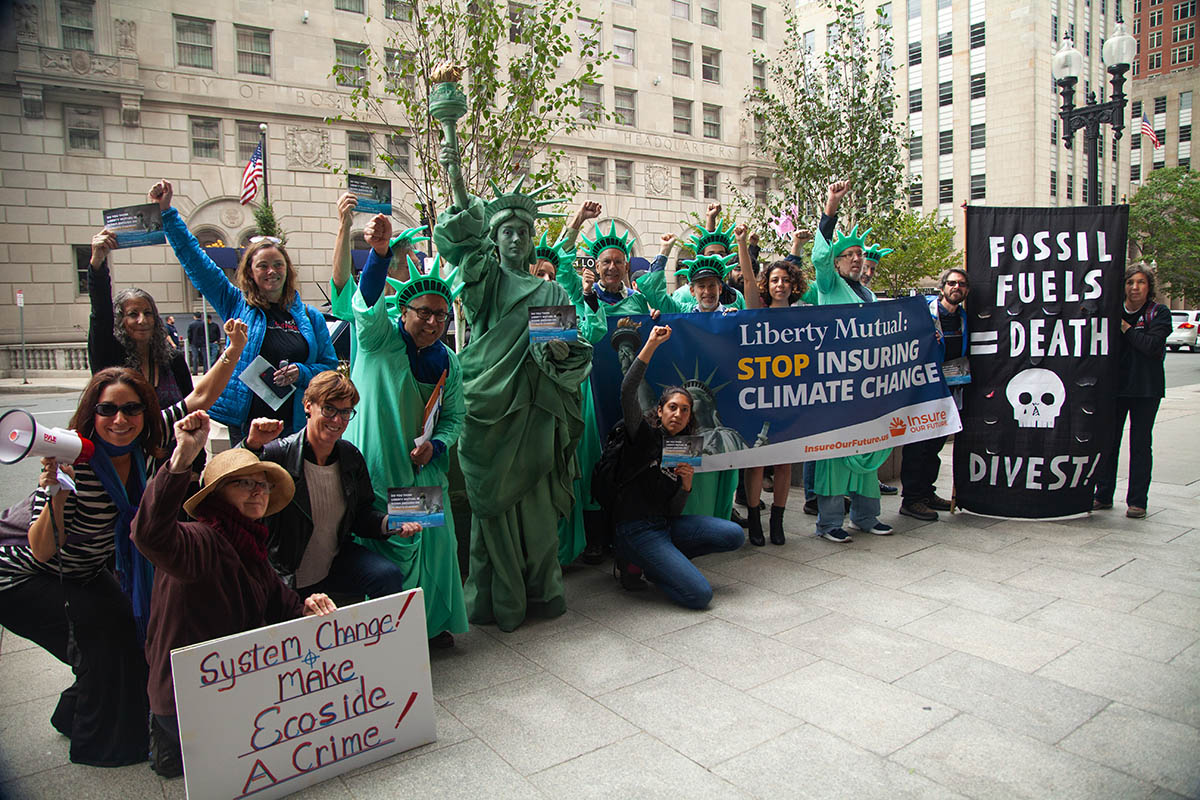In order to build a new fossil fuel project, companies need three things: Money, Insurance, and Permits.
In order to stop the climate crisis, we need to get fossil fuels out of every industry. Especially Big Insurance. Insurance companies’ entire purpose is to mitigate risk. But while the climate crisis is the biggest risk of all, insurance companies continue to back these dirty, destructive projects for a profit.
Insurance companies are backing the Climate Crisis.
The insurance industry is supposed to protect us from catastrophic damages – like the fires, flooding and storm damage caused by the climate crisis. But it turns out that insurance companies are actually a huge part of the problem. Insurance giants like Chubb, Liberty Mutual, and AIG are fueling the climate crisis, while withdrawing from the communities they claim to protect.
How exactly?
Well, fossil fuel companies need a few things to build a new project:
❏ Money
❏ Insurance
❏ Permits
The insurance industry supports fossil fuel companies and projects with those first two by:
- Investing in fossil fuel companies: Insurance companies take your premium (that’s the money you pay for your car, home, and health insurance) and invest it in fossil fuels. It’s estimated that insurance companies have more than $536 billion invested in coal, oil, and gas companies.
- Insuring fossil fuel projects: You can’t drive a car or buy a house without insurance. Without insurance, energy companies can’t build or operate destructive fossil fuel projects like pipelines, coal-fired power plants or fracking wells. Insurers can single handedly stop the expansion and operation of most fossil fuel projects just by refusing to insure them.
The insurance industry understands the dangers of the climate crisis we’re in. They know this isn’t a future problem, because they’re paying for climate damages right now in communities across the country. But instead of protecting our communities, they’re increasing the costs of insurance or withdrawing coverage entirely from regions that are experiencing the worst climate impacts now, like the coasts of Florida and wildfire-ravaged counties in California.
And just as these companies are abandoning the communities that need help the most, they continue actively propping up the fossil fuel industry instead.
The science is clear.
We can’t afford any more investment in fossil fuels and we have less than 10 years left to prevent the worst impacts of climate disaster. The transition to a clean energy future is underway, but our lives literally depend on scaling it up rapidly. Insurers have a key role to play in making that happen today.
How to Insure Our Future
The insurance industry literally has the power to change the world by withholding insurance from any new fossil fuel projects. It shouldn’t be hard to convince them: after all, it’s the insurance companies who will be left paying for the worst impacts of climate disasters.
But that’s where YOU come in.
We need your support to take on Chubb, one of the biggest fossil fuel insurers in the world. In the midst of the climate emergency, Chubb is insuring new methane export terminals on the Gulf Coast and offshore oil drilling in Brazil, expanding fossil fuel extraction and trampling on Indigenous rights.
Our demands
We’re demanding that Chubb and the world’s top insurance companies adopt policies that meet the scale and urgency of the climate crisis.
We’re calling these insurance companies to:
- Immediately cease insuring new and expanded coal, oil, and gas projects.
- Immediately stop insuring any new customers from the fossil fuel sector which are not aligned with a credible 1.5ºC pathway, and stop offering any insurance services which support the expansion of coal, oil and gas production at existing customers. By March 2025, phase out all insurance services for existing fossil fuel company customers which are not aligned with such a pathway.
- Immediately divest all assets, including assets managed for third parties, from coal, oil, and gas companies that are not aligned with a credible 1.5ºC pathway.
- Define and adopt binding targets for reducing your insured emissions which are transparent, comprehensive and aligned with a credible 1.5ºC pathway.
- Immediately establish, and adopt as policy, robust due diligence and verification mechanisms to ensure clients fully respect and observe all human rights, including a requirement that they obtain and document the Free, Prior, and Informed Consent (FPIC) of impacted Indigenous Peoples as articulated in the UN Declaration on the Rights of Indigenous Peoples.
- Immediately bring stewardship activities, membership of trade associations and public positions as a shareholder and corporate citizen in line with a credible 1.5ºC pathway in a transparent way.
